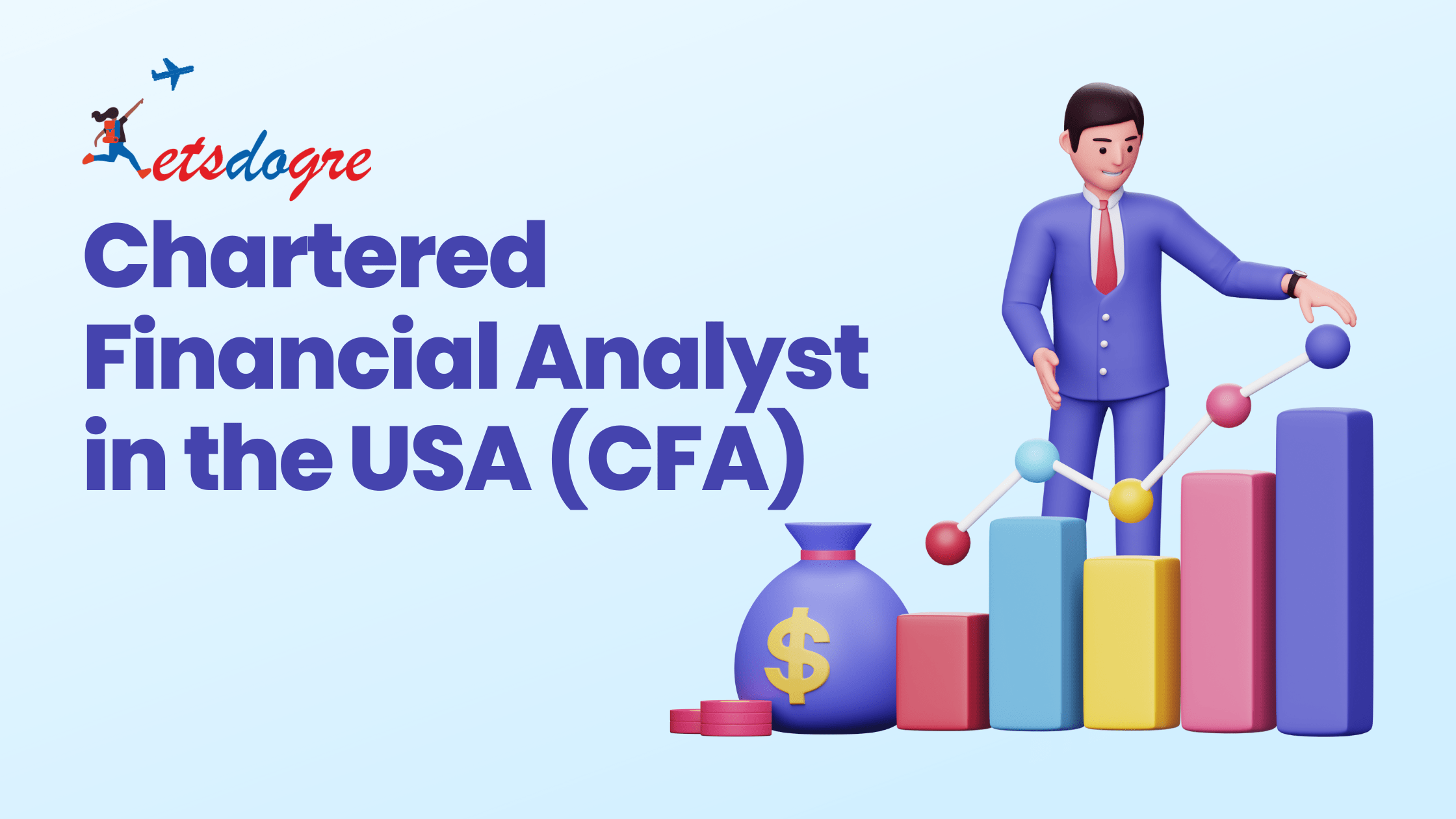
- April 1, 2024
- 12:27 pm
-
Views: 315
Chartered Financial Analyst in the USA
Introduction to Chartered Financial Analysis (CFA)
CFA is renowned for its rigorous curriculum and high standards, making it a prestigious credential sought after by finance professionals worldwide. It covers a wide range of topics, including ethics, economics, portfolio management, and equity analysis, preparing candidates to thrive in various financial roles.
How to Become a Chartered Financial Analyst?
Chartered Financial Analysis (CFA) is a globally recognized certification that equips individuals with comprehensive knowledge and skills in investment management and financial analysis. For international students aspiring to excel in the field of finance, pursuing a CFA in the USA can open doors to lucrative career opportunities and establish a solid foundation in the industry.
CFA Institute
The Chartered Financial Analyst (CFA) program itself isn’t a university program but a professional certification offered by the CFA Institute. Universities don’t directly provide the CFA program, but many universities can help you prepare for the CFA exams.
The CFA Institute is a global association of investment professionals that sets the standard for professional excellence and ethics in the finance industry. Established in 1947, the CFA Institute is headquartered in Charlottesville, Virginia, USA, and has regional offices around the world, including in London, Hong Kong, Mumbai, and Beijing.
Here’s why universities aren’t directly involved:
Self-Study Program
The CFA program is designed for independent study, although some universities might provide preparatory courses or resources.
Standardized Exams
The CFA exams are administered by the CFA Institute globally, ensuring consistency in the assessment process.

Benefits of Pursuing CFA in the USA
One of the primary advantages of obtaining CFA certification in the USA is the plethora of career opportunities available in the country’s dynamic financial market. Whether aspiring to work in investment banking, asset management, or hedge funds, CFA opens doors to a diverse array of roles with competitive salaries and growth potential.
Exam Structure and Format
The CFA exams are renowned for their arduous nature and high level of complexity. The three tiers of exams are typically offered annually, with Level I available in June and December and Levels II and III exclusively in June.
Level I: Concentrates on fundamental knowledge and comprehension of investment tools.
Level II: Emphasizes application and analysis of investment tools and concepts.
Level III: Focuses on synthesis and evaluation of investment tools and portfolio management.
Each exam comprises multiple-choice questions, item set questions (where candidates are presented with a vignette and asked to answer several associated questions), and constructed response (essay) questions for Level III.
Requirements and Eligibility
To enroll in the CFA program, candidates must have a four-year undergraduate degree or equivalent education. However, students in their final year of undergraduate studies are also eligible to sit for the exam.
Careers after Chartered Financial Analyst
Investment Management: Many CFAs work in investment management roles, where they are responsible for managing investment portfolios on behalf of clients, institutions, or funds. This may involve conducting research, analyzing investment opportunities, and making investment decisions to achieve financial objectives.
Financial Analysis: CFAs often pursue careers as financial analysts, where they assess the financial performance of companies, industries, or investment opportunities. They analyze financial statements, evaluate risks, and make recommendations to support investment decisions.
Portfolio Management: CFAs may specialize in portfolio management, where they oversee the allocation of assets within investment portfolios to achieve specific investment objectives. This involves balancing risk and return considerations, monitoring portfolio performance, and making adjustments as needed.
Risk Management: CFAs can work in risk management roles, where they identify, assess, and mitigate financial risks for individuals, institutions, or companies. This may involve developing risk management strategies, implementing risk controls, and monitoring risk exposure.
Private Wealth Management: CFAs may pursue careers in private wealth management, where they provide personalized financial advice and investment solutions to high-net-worth individuals and families. This involves understanding clients’ financial goals and risk tolerance and designing tailored investment strategies to meet their needs.
Corporate Finance: CFAs may work in corporate finance roles within companies, where they are involved in financial planning, analysis, and decision-making to support business objectives. This may include capital budgeting, economic forecasting, and evaluating investment opportunities.
Equity Research: CFAs may work as equity research analysts, analyzing publicly traded companies and making investment recommendations to institutional investors, such as mutual funds, hedge funds, or pension funds. This involves conducting in-depth analyses of company fundamentals, industry trends, and market conditions.
Consulting: CFAs may pursue careers in financial consulting, where they advise clients on various financial matters, such as mergers and acquisitions, valuation, strategic planning, and economic restructuring. This may involve working for consulting firms or as independent consultants.
Hedge Funds and Alternative Investments: CFAs may work in hedge funds or other alternative investment firms, where they manage alternative investment strategies, such as hedge funds, private equity, venture capital, or real estate. This involves identifying investment opportunities, conducting due diligence, and managing investment portfolios.
Teaching and Research: Some CFAs may pursue careers in academia, teaching finance courses at universities, or conducting research in areas such as asset pricing, portfolio management, or behavioral finance. This may involve pursuing advanced degrees, such as a Ph.D. in finance, and publishing research in academic journals.
Some US Universities offer Chartered Financial Analyst course
Fordham University
Indiana University – Purdue University Indianapolis
University of Minnesota
Connect with us for more information on universities offering Chartered Financial Analyst courses in the USA
Frequently Asked Questions
CFA Institute Access Scholarships: The CFA Institute offers Access Scholarships to eligible candidates, including international students, who may not be able to afford the full cost of the CFA Program enrollment and exam registration fees. These scholarships cover a significant portion of the program costs, including enrollment fees and exam registration fees for each level. Interested students can check the CFA Institute's website for eligibility criteria and application details.
Employer Sponsorship: International students who are currently employed or have secured employment in the finance industry may explore employer sponsorship options. Some employers may offer financial assistance or reimbursement for CFA Program enrollment and exam registration fees as part of their professional development programs.
Government Scholarships: International students may investigate scholarship programs offered by their home countries' governments or international organizations that support education and professional development in finance-related fields. These scholarships may provide funding for professional certifications like the CFA designation.
Financial Aid Resources: International students can explore general financial aid resources, such as private scholarships, grants, and loans, to help offset the costs of CFA Program enrollment and exam fees. Online scholarship databases, financial aid websites, and international student resource centers may provide information on available funding opportunities.
Like any other CFA, the salary of a Chartered Financial Analyst (CFA) for international students can vary significantly based on several factors. These include location, level of experience, industry, and the specific employer. However, it's important to note that being an international student may have implications for salary expectations, particularly concerning work authorization and visa status.
International students who obtain the CFA designation and secure employment in the United States may expect competitive salaries commensurate with their skills and qualifications. According to data from the CFA Institute's 2021 Compensation Survey, the median salary for CFAs in the United States was around USD 180,000.
While a bachelor's degree is recommended, candidates with equivalent education or relevant work experience may also apply for the CFA program.
The average candidate takes approximately four years to complete all three levels of the CFA exam and obtain the charter.





